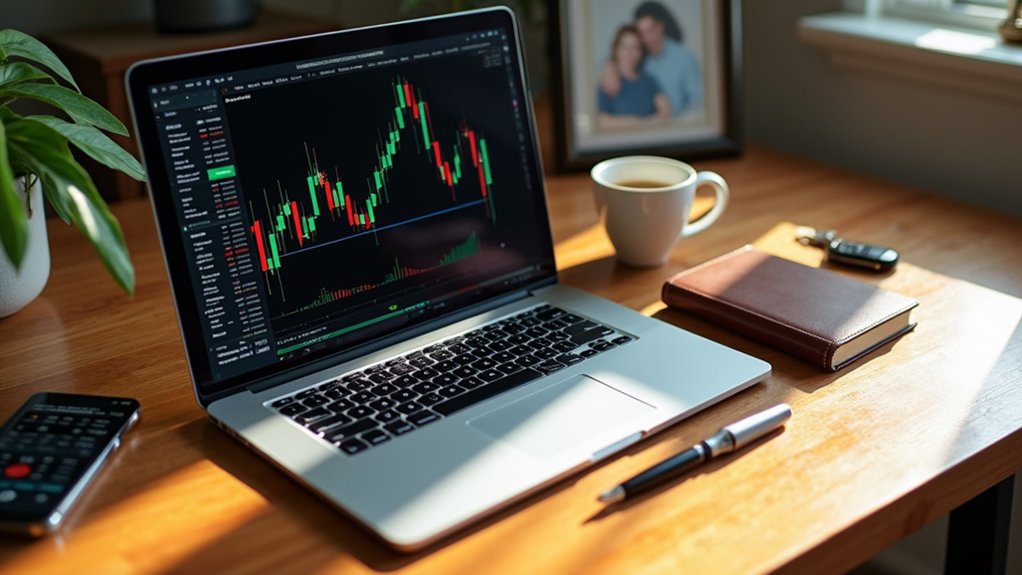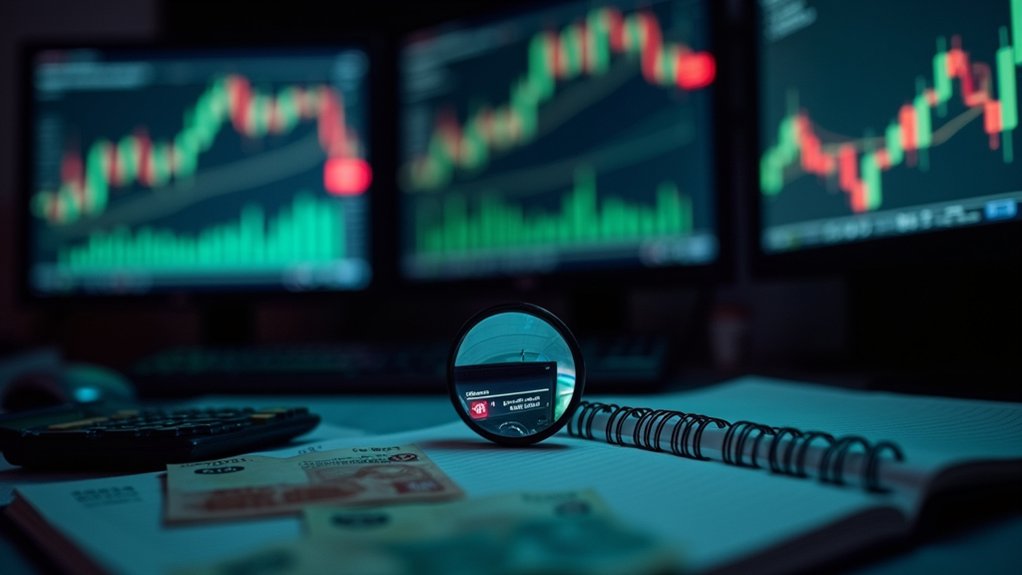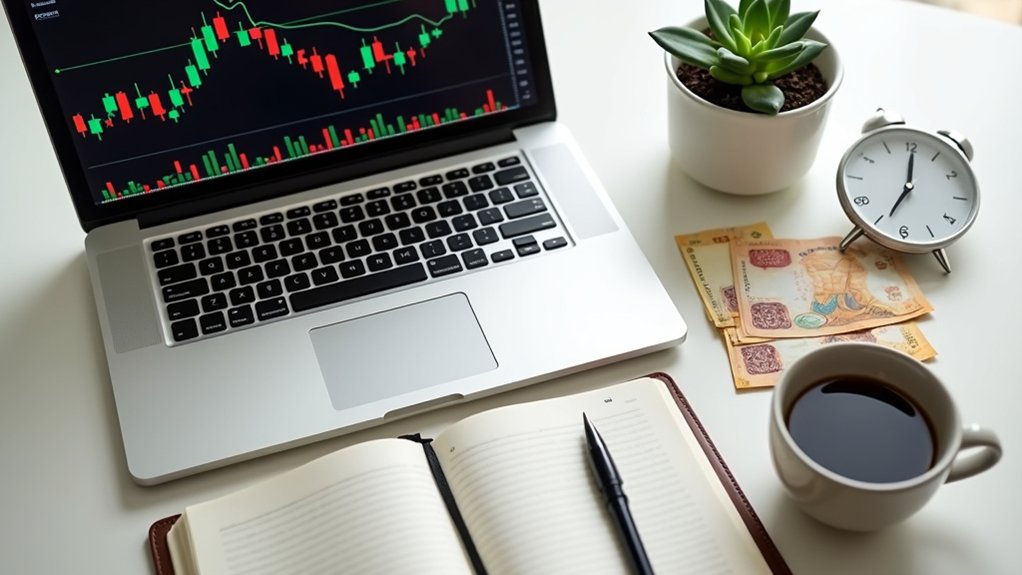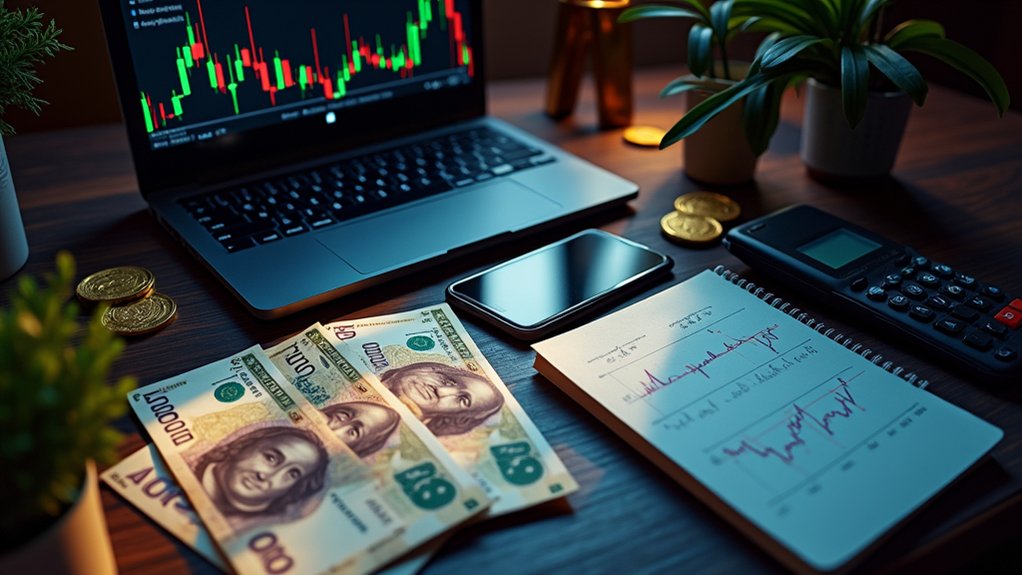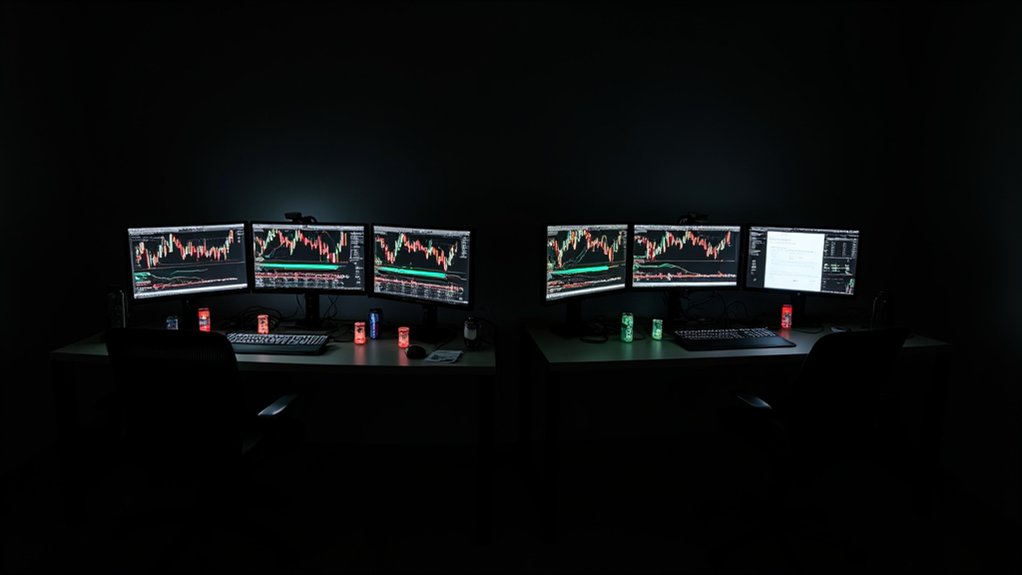Forex trading can technically be a full-time job, but reality is brutal. Only 10% of retail traders sustain profits long-term while 90% lose money. Even more telling: 88% of forex traders worldwide keep their day jobs because they don't trust trading as reliable income. High leverage, volatility, and emotional stress erode accounts fast. The 24-hour market offers flexibility but zero income guarantees. It's possible, sure—but for most people it's closer to gambling than career planning. The full picture reveals why sustainability remains so elusive.

Often, the dream of quitting a regular job to trade forex full-time sounds like freedom—no boss, no commute, just profits rolling in from a laptop. But the reality across Africa, and globally, tells a different story. Only about 12% of forex traders actually consider trading a feasible full-time job. That's it. Twelve percent. The other 88% might believe forex could lead to substantial wealth, but they're not quitting their day jobs.
Only 12% of forex traders worldwide see it as a viable full-time career—the rest keep their day jobs.
In the United States, where data is more readily available, the average full-time forex trader earns around $101,533 annually. That sounds decent until you realize it's a profession with brutal turnover and massive variance. The 25th percentile sits at $57,500 while the top 10% clear over $192,500. Skill, experience, and location matter tremendously.
Cities like Berkeley and New York pay up to 21% above the national average, but good luck finding those opportunities in Lagos, Nairobi, or Johannesburg with the same consistency.
Education plays a role too. In the US, 61% of forex traders hold a Bachelor's degree, 20% have a Master's, and those with advanced degrees earn markedly more—Master's holders average $146,537. But across Africa, where access to formal finance education is uneven and expensive, that pathway isn't always realistic.
The average age of a US trader is 43 years old, mostly male (91.5%), and it takes years to develop real skill. About 31% of traders have less than one year of experience, and 39% have been trading for just one to three years. Only 7% make it past ten years. Job tenure shows that 27% stay 1–2 years, reflecting how difficult it is to sustain this career long-term.
Here's the hard truth: only 10% of retail forex traders achieve sustainable profits. Ninety percent lose money long-term. That's not unique to Africa—it's a global pattern. High leverage, volatility, and emotional stress chew through accounts. Most profitable traders keep their regular jobs and trade part-time. The forex market runs 24 hours, so flexibility exists, but that doesn't make it easy or reliable income. For those exploring alternative career paths, platforms offering millions of daily job postings can provide more stable income opportunities while building trading experience.
For African traders facing unstable currencies, limited access to reputable brokers, withdrawal challenges, and regulatory uncertainty, the path to full-time trading is even steeper. Understanding the risks and truths behind currency market speculation is crucial before committing to this path. Full-time trading can allow larger returns and faster progress, but it comes at the cost of losing salary and job security that a 9-to-5 provides. The dream is real, but the statistics are ruthless. Understanding realistic income ranges for professional forex traders is essential before making the leap from stable employment to full-time trading. Success in forex requires not just understanding technical analysis, but also grasping the realities and risks inherent to currency speculation. Looking ahead, the viability of forex trading depends heavily on individual circumstances, risk tolerance, and whether the potential rewards justify the significant financial and psychological risks involved. Full-time forex trading can technically be a job, but for the vast majority—especially across Africa—it's a gamble, not a career plan.
Common Questions
What Minimum Capital Do African Traders Need to Go Full-Time?
Most African traders eyeing full-time forex need around $10,000 to $25,000 USD minimum—that's the practical floor for making modest monthly income ($500–$1,000) while respecting risk management rules.
Sure, brokers let you open accounts with $5 or $50, but surviving off those tiny balances? Fantasy.
Living expenses, drawdowns, and leverage traps demand serious capital.
South Africa's professionals often recommend $10,000+; anything less becomes gambling, not income.
Economic reality bites hard here.
How Do Internet Outages Affect Full-Time Trading in Rural African Areas?
Internet outages kill full-time trading dreams in rural Africa. Period. When cables snap or power dies, rural traders go completely dark—sometimes for days or weeks. No backup, no trade execution, no income.
Rural areas across Benin, Zambia, Zimbabwe, and Mozambique face repeated blackouts and connectivity collapses. With only 6.3% of rural households online and outages spiking across the continent, consistent market access becomes fantasy.
Real-time trading? Forget it. Full-time? Not without moving closer to stable infrastructure.
Can I Trade Forex Full-Time Without a Regular Bank Account?
Trading full-time without a regular bank account? Technically possible, but it's a minefield.
Most reputable brokers in South Africa, Kenya, Nigeria, and Egypt demand a bank account for AML compliance and withdrawals. E-wallets like Skrill or crypto deposits work with some platforms, but expect higher fees, withdrawal headaches, and limits that kill scalability.
Worse, no bank account pushes traders toward sketchy, unregulated offshore brokers where money vanishes faster than sense. It's doable—just unnecessarily risky and expensive.
Do African Brokers Offer Salary-Like Withdrawals for Full-Time Traders?
No African broker offers salary-like withdrawals to full-time traders. That's not how this works. Brokers process withdrawals on request—bank transfer, card, e-wallet—but nothing automatic or scheduled like a paycheck. Traders manage their own cash flow.
Some South African brokers offer ZAR accounts to ease conversions, and a few provide free monthly withdrawals, but that's convenience, not employment. No contracts, no fixed payments, no guaranteed income. Trading profits aren't salaries—they're just profits.
How Do Tax Authorities in African Countries Treat Full-Time Forex Income?
Tax authorities in South Africa and Nigeria treat full-time Forex income as taxable—no escaping it. South African traders pay personal income tax up to 45% and must register as provisional taxpayers, filing at least twice yearly.
Nigeria applies a 10% capital gains tax, though enforcement remains patchy. Both countries demand annual returns and detailed trade records. Deductible expenses like software and internet help reduce liability. Miss a filing? SARS and FIRS will come knocking with penalties.
